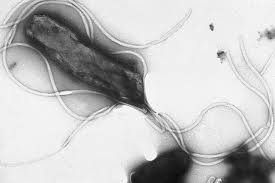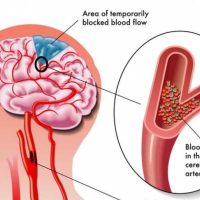 Helicobacter pylori, also known as H. pylori, are a bacterium that is commonly found in the stomach. It is present in approximately one-half of the world’s population.
Helicobacter pylori, also known as H. pylori, are a bacterium that is commonly found in the stomach. It is present in approximately one-half of the world’s population.
H. pylori are probably spread by consuming food or water contaminated with fecal matter. H. pylori cause changes to the stomach and duodenum, the first part of the small intestine. The bacteria invade the protective tissue that lines the stomach. This leads to the release of certain enzymes and toxins. These enzymes and toxins may directly or indirectly injure the cells of the stomach or duodenum.
As a result of these changes, the stomach and duodenum are more vulnerable to damage from digestive juices, such as stomach acid. This causes chronic inflammation in the walls of the stomach (gastritis) or duodenum (duodenitis).
Less commonly, a chronic condition of stomach inflammation or chronic gastritis causes abnormal changes in the stomach lining, which can lead to certain forms of cancer. It is uncommon to develop cancer as a result of H. pylori infection. Nevertheless, because so many people in the world are infected with H. pylori, it is considered to be an important cause of stomach cancer. People who live in countries in which H. pylori infection occurs at an early age are at greatest risk of stomach cancer.
Symptoms
Most people with H. pylori infection will never have any signs or symptoms. About 3 in 20 people
who are infected with H. pylori develop an ulcer. When signs or symptoms do occur with H. pylori infection, they may include:
- An ache or burning pain in your abdomen
- Nausea
- Vomiting
- Frequent burping
- Bloating
- The above symptoms usually leads to loss of appetite and weight loss
When to see a doctor
Seek immediate medical help if you experience:
- Severe or persistent abdominal pain
- Difficulty swallowing
- Bloody or black tarry stools
- Bloody or black vomit or vomit that looks like coffee grounds
Complications
Complications associated with H. pylori infection include:
- Ulcers. H. pylori can damage the protective lining of your stomach and small intestine. This can allow stomach acid to create an open sore (ulcer).
- Inflammation of the stomach lining. H. pylori infection can irritate your stomach, causing inflammation (gastritis).
- Stomach cancer. H. pylori infection is a strong risk factor for certain types of stomach cancer.
Tests and diagnosis
Tests and procedures used to determine whether you have an H. pylori infection include:
- Blood test. Analysis of a blood sample may reveal evidence of an active or previous H. pylori infection in your body.
- Breathe test. During a breath test, you swallow a pill, liquid or pudding that contains radioactive carbon molecules. If you have an H. pylori infection, the radioactive carbon is released when the solution is broken down in your stomach. Your body absorbs the radioactive carbon and expels it when you exhale. You exhale into a bag and your doctor uses a special device to detect the radioactive carbon.
- Stool test. A laboratory test called a stool antigen test looks for foreign proteins (antigens) associated with H. pylori infection in your stool.
- Scope test. During an endoscopy exam, your doctor threads a long flexible tube equipped with a tiny camera (endoscope) down your throat and esophagus and into your stomach and duodenum. Using this instrument, your doctor can view any irregularities in your upper digestive tract and remove tissue samples (biopsy). These samples are analyzed for H. pylori infection.
If you do not have symptoms — H. pylori testing is usually not recommended if you have no symptoms and no past history of peptic ulcer disease. However, it may be considered for selected people, such as those with a family history or concern about stomach cancer.
Treatments and drugs
H. pylori infections are usually treated with two varieties of antibiotics at once, to help prevent the bacteria from developing a resistance to one particular antibiotic. Your doctor also will prescribe an acid suppression drug, to help your stomach lining heal. Combination therapy clears H. pylori in up to 9 in 10 cases if it is taken correctly for the full course.
Your doctor may recommend that you undergo testing for H. pylori several weeks after your treatment. If the tests show the treatment was unsuccessful, you may undergo another round of treatment with a different combination of antibiotic medications.











